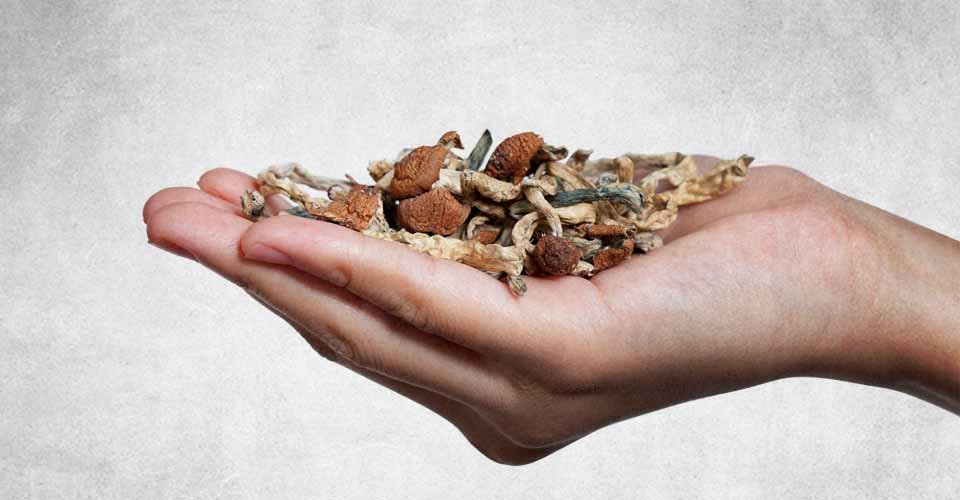New Study Finds Magic Mushrooms Could Be a Game Changer For People With Depression And Anxiety

Two studies have recently reported that a single dose of psilocybin can reduce anxiety and depression in terminally-ill patients, with results lasting 6 months.
According to research published in The Lancet, 40% of cancer patients experience some sort of mood disorder during treatment, and evidence suggests that antidepressants simply aren’t effective in these situations.
Magic mushrooms, on the other hand, have a surprising success rate.
Two randomized, blinded studies were recently published in – one by Johns Hopkins University, and the other by New York University Langone Medical Center. They both show how psilocybin can be used for treatment of terminally-ill patients and reported that patients felt decreased levels of anxiety for up to 6 months after taking a single dose.
“The most interesting and remarkable finding is that a single dose of psilocybin, which lasts four to six hours, produced enduring decreases in depression and anxiety symptoms, and this may represent a fascinating new model for treating some psychiatric conditions,” said Roland Griffiths, lead author of the Johns Hopkins study.
The study from Johns Hopkins involved 51 participants with terminal cancer diagnoses who completed a five-week session of both high and low doses of psilocybin. New York Universty’s Langone Medical Center study had 29 participants.
In the study from NYU, the 29 cancer patients who were suffering from anxiety and depression were given a pill of either psilocybin or a placebo (niacin). 8 weeks later, they were given the opposite pill.
Researchers found that the experience patients had from psilocybin calmed them both immediately afterward and 6 months later. Furthermore, 80% of these patients reported the drug worked “better than” prescription antidepressants, according to mental health surveys taken before and after the trial.
“The randomization, placebo control, and double-blind procedures maximized the validity of the study results,” Dr. Jeffrey Guss, NYU study investigator said.
The Johns Hopkins study involved 51 patients with similar diagnoses and symptoms. They were given either a low dose of psilocybin, approximately three milligrams, or a high dose, about 25 milligrams. Then, they received the opposite dose 5 weeks later.
Not surprisingly, similar results to the NYU study were achieved. Researchers discovered that the majority of participants felt their mental health symptoms were alleviated almost immediately, and lasted 6 months after tripping on the high dose. In fact, 65% reported no longer feeling any depression or anxiety.
What did the participants have to say about their experience?
The Atlantic reports that 2/3 of the patients who participated in the experiment rated it as one of the “top 5 most meaningful of their lives.” They said they experienced improvements and positive changes in their attitudes, about their lives, and their with their social relationships.
“People will say, ‘I know I’m dying, I’m sad that I’m dying, but it’s okay,” Griffiths said. “Things are going to be alright.”
Stephen Ross, a psychiatrist at NYU and lead author of one of the studies, told the Atlantic, “The most surprising thing to me is that this actually worked. I was highly skeptical.” Before treatment began, several of the participants would go through highly emotional states of crying or shaking when they would discuss their cancer. But “the moment they get psilocybin, their distress comes down. That’s very new in psychiatry, to have a medication that works immediately for depression and anxiety and can last for that long.”
Legalities of Psilocybin Research are Preventing New Treatments for Depression
It seems that scientists haven’t been able to pinpoint exactly how these drugs work towards combating mental health issues, or how they contribute to the lasting feeling of contentedness. But they do have a theory.
Perhaps when these patients engaged in the intense, emotional hallucinations brought on by psilocybin, they were able to experience and process their circumstances in ways they normally wouldn’t have been able to.
David Spiegel is a psychiatrist at Stanford University. Though he is unaffiliated with either study, he did write a commentary accompanying them.
“Increasing the power of experience may help people acquire a new perspective on themselves and their lives.”
How soon can you expect to see psilocybin treatment available?
Well for now it seems treatments like the ones in these studies are only available through well-funded experiments. This is because although researchers can acquire psilocybin for their studies, it’s still classed as an illegal drug. Therefore, turning it into a regulated medicine isn’t going to be easy.
George Greer is the medical director at Heffter Research Institute, which funded the two studies.
This is what he says about the possibility:
“What I can say is this: We expect the FDA’s assessment of psilocybin to move forward,” he said. “As the research evidence grows on psilocybin’s safety and effectiveness, we think the FDA will want to learn more, and the process for helping cancer patients with depression and anxiety will continue to advance.”
This isn’t the first time scientists have looked into the medicinal effects of psilocybin. Several smaller studies have shown the drug’s potential effectiveness in treating alcoholism, obsessive-compulsive disorder, depression, and smoking. As more and more research accumulates, we can only hope that psilocybin will one day be readily available to those who need it most.
By Raven Fon


